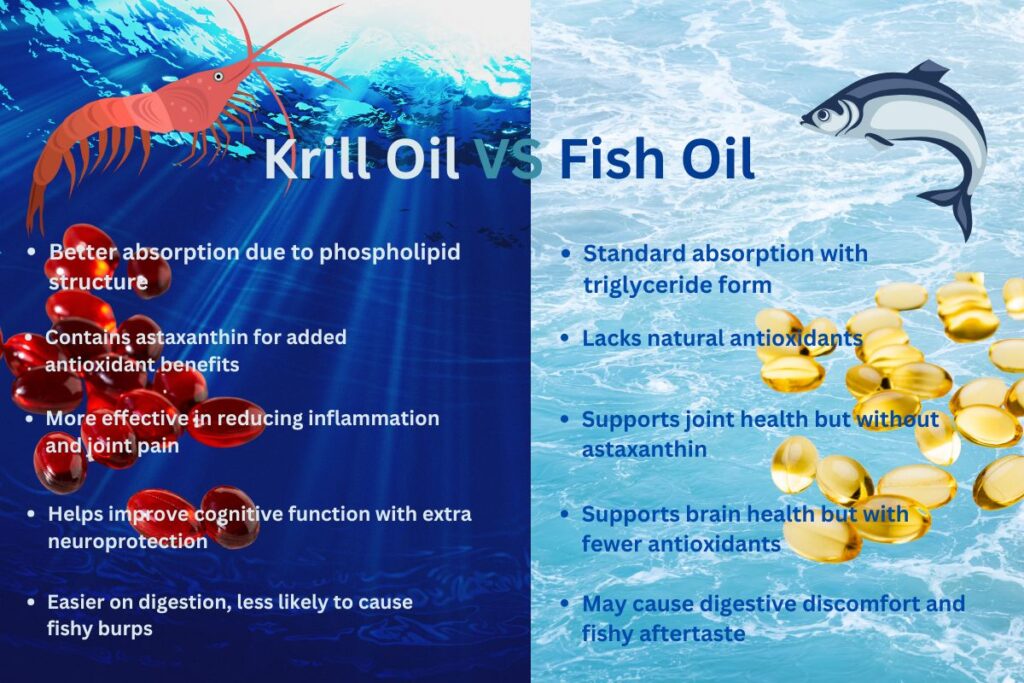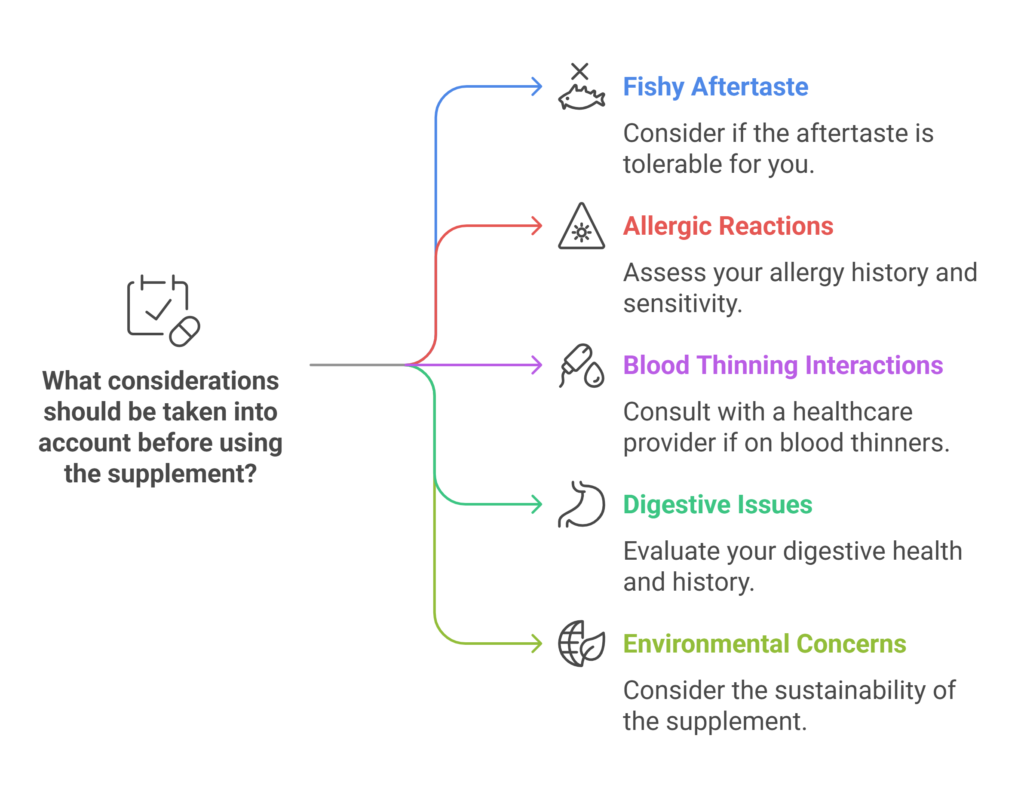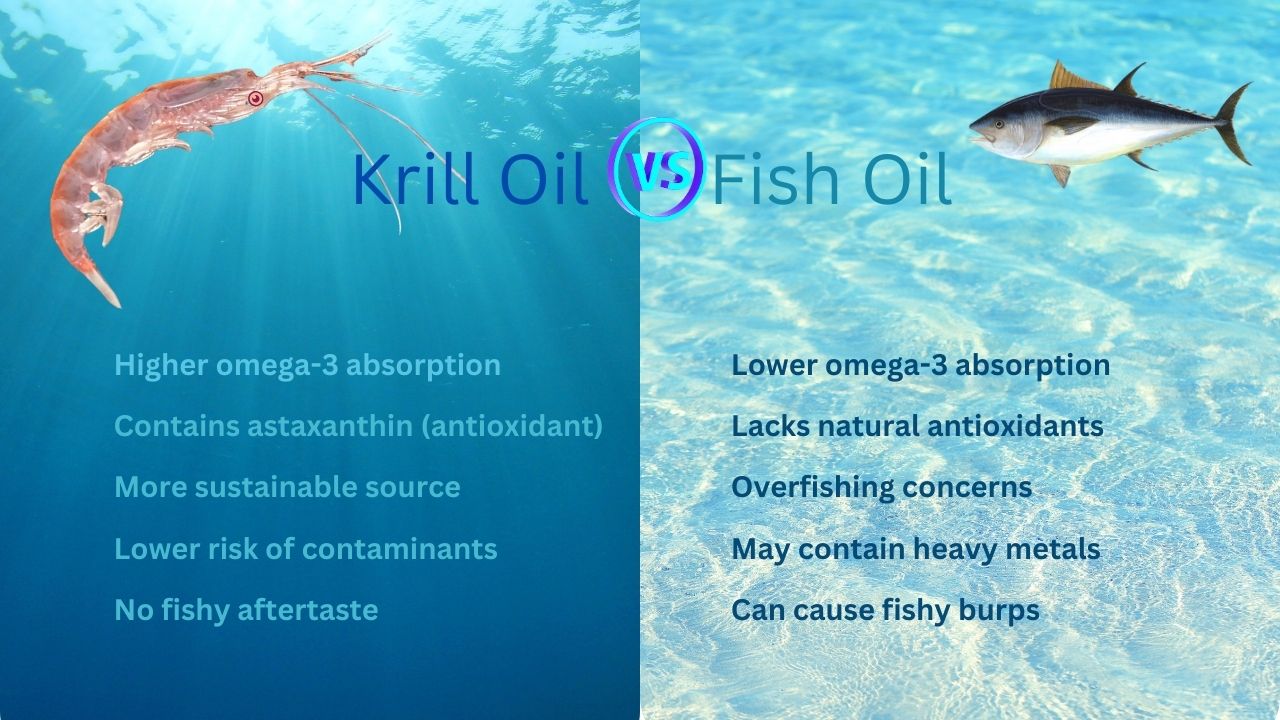Krill Oil vs. Fish Oil: A Better Omega-3 Source?
If you’re looking for the best omega-3 supplement, you’ve probably come across the Krill vs. Fish Oil: A Better Omega-3 Source debate. Both provide essential EPA and DHA fatty acids that support heart health, brain function, and inflammation reduction, but the differences go beyond just their source.
Krill oil stands out for its better absorption, powerful antioxidant content, and eco-friendly harvesting, while fish oil remains a widely available and cost-effective option with high omega-3 concentrations. Choosing the right one depends on your health goals, dietary needs, and sustainability concerns.
So read on because we’re breaking down the key differences between krill oil and fish oil, helping you decide which is the best omega-3 source for your health.
Understanding Omega-3s: Essential Fats for Your Health
Omega-3 fatty acids are crucial nutrients that your body cannot produce on its own, meaning they must come from your diet or supplements. These fats act as fundamental building blocks, playing a vital role in reducing inflammation and supporting heart, brain, and joint health. Without sufficient omega-3 intake, various bodily functions may not operate optimally.

Types of Omega-3s: ALA, EPA, and DHA
There are three primary types of omega-3s:
- ALA (Alpha-Linolenic Acid): Found in plant sources like flaxseeds and walnuts.
- EPA (Eicosapentaenoic Acid): Mainly sourced from marine oils such as fish and krill oil.
- DHA (Docosahexaenoic Acid): Also derived from marine sources and essential for brain and heart health.
Among these, EPA and DHA are the most beneficial, known for their ability to regulate inflammation, enhance cognitive function, and protect cardiovascular health.
Krill Oil vs. Fish Oil: A Comparison of Nutritional Benefits
When it comes to omega-3 supplements, fish oil has been the traditional choice, but krill oil is gaining popularity due to its unique advantages. Both provide essential omega-3 fatty acids, but they differ in composition, absorption, and sustainability. Here’s a detailed comparison:
Omega-3 Content
Krill Oil:
- Contains EPA and DHA, but in lower concentrations compared to fish oil.
- Omega-3s are bound to phospholipids, making them more bioavailable and easier for the body to absorb.
Fish Oil:
- Typically has higher concentrations of EPA and DHA.
- Omega-3s are bound to triglycerides, which require additional processing in the body for absorption.
Bioavailability and Absorption
Krill Oil:
- Omega-3s in krill oil are attached to phospholipids, which integrate easily into cell membranes.
- Faster and more efficient absorption, meaning the body can utilize smaller doses effectively.
Fish Oil:
- Omega-3s are in triglyceride form, which requires more processing for absorption.
- Can take longer to be utilized by the body compared to krill oil.
Antioxidant Content
Krill Oil:
- Naturally contains astaxanthin, a powerful antioxidant that helps protect omega-3s from oxidation.
- Provides additional anti-inflammatory and skin-protective benefits.
Fish Oil:
- Does not contain astaxanthin naturally.
- More prone to oxidation, so many fish oil supplements include added antioxidants to maintain freshness.
Sustainability and Environmental Impact
Krill Oil:
- Harvested from the well-regulated waters of Antarctica.
- Considered a more sustainable option due to responsible fishing practices and the abundance of krill.
Fish Oil:
- Sourced from fish species like anchovies, sardines, and mackerel, some of which are at risk of overfishing.
- Environmental concerns regarding marine ecosystem impact and bycatch.
Digestibility and Side Effects
Krill Oil:
- Easier on digestion, with fewer reports of stomach discomfort or fishy burps.
- Less likely to cause gastrointestinal issues due to its phospholipid structure.
Fish Oil:
- Some users experience fishy aftertaste, burping, or digestive discomfort.
- May be harder to digest, especially for those with sensitive stomachs.
Health Benefits: Krill Oil vs. Fish Oil
Both krill oil and fish oil are praised for their omega-3s, but each offers unique health benefits that make them stand out in different ways. Here’s a comparison of their key health advantages.

Heart Health and Cholesterol Control
Krill oil’s astaxanthin adds an extra layer of protection, helping to reduce oxidative stress and inflammation in the brain, which may enhance mental clarityBoth krill oil and fish oil are great for supporting heart health. Omega-3s help reduce triglycerides, lower blood pressure, and support overall cardiovascular function. While fish oil is more commonly used for heart health, krill oil may offer superior benefits due to its phospholipid structure, which may help with better absorption and effectiveness in reducing cholesterol levels.
Joint Pain and Inflammation Relief
Omega-3s are well known for their anti-inflammatory properties, and both oils can help reduce joint pain and stiffness, especially in conditions like arthritis. Krill oil, however, has an advantage due to the added benefit of astaxanthin, a powerful antioxidant that helps fight inflammation more effectively. This makes krill oil a top choice for those suffering from chronic joint pain.
Mental Health and Cognitive Function
This makes krill oil a great choice for those looking to maintain youthful, glowing skinWhen it comes to supporting brain health, omega-3s are crucial. Both fish oil and krill oil help improve mood, reduce the symptoms of depression, and support cognitive function. Krill oil’s astaxanthin adds an extra layer of protection, helping to reduce oxidative stress and inflammation in the brain, which may enhance mental clarity and protect against age-related cognitive decline.
Skin Health and Aging
Fish oil and krill oil can both contribute to healthier skin, reducing dryness, irritation, and signs of aging. Krill oil takes it a step further thanks to its antioxidant astaxanthin, which helps protect skin cells from oxidative damage caused by UV rays and pollution. This makes krill oil a great choice for those looking to maintain youthful, glowing skin.
Digestion and Absorption
Krill oil is often easier on the digestive system than fish oil. The phospholipid structure of krill oil allows for faster and better absorption, which means the body can use the omega-3s more effectively. This makes krill oil a better choice for individuals who may experience discomfort or digestive issues when taking fish oil, such as fishy burps or stomach upset.
Now here comes the good part, whether you choose krill oil or fish oil, both offer powerful health benefits, but your choice depends on your specific needs and preferences. Let’s look at how to decide which is right for you.
Side Effects and Considerations
When it comes to supplements, it’s important to consider both the benefits and any potential side effects. Krill oil and fish oil are generally safe for most people, but there are a few things to keep in mind to ensure you’re making the best choice for your body.

Fishy Aftertaste and Burps
One of the most common side effects of fish oil is the dreaded fishy aftertaste or burps. Many people find it unpleasant, especially when taking large doses. Krill oil, however, tends to be easier on the stomach, with fewer reports of fishy aftereffects. If you’re sensitive to taste, krill oil may be the better option.
Possible Allergic Reactions
Since both krill oil and fish oil come from marine life, there’s a small risk of allergic reactions, especially for people who are allergic to shellfish or fish. If you have a history of allergies to seafood, it’s important to consult with your doctor before starting either supplement.
Blood Thinning and Medication Interactions
Omega-3 fatty acids, whether from krill oil or fish oil, have blood-thinning properties. While this can be beneficial for cardiovascular health, it may interact with blood-thinning medications like aspirin or warfarin. If you’re on any of these medications, it’s important to talk to your doctor before adding omega-3s to your routine.
Stomach Upset and Digestive Issues
For some people, both fish oil and krill oil can cause mild digestive discomfort, like bloating or indigestion. Krill oil’s smaller, easier-to-digest capsules may cause fewer digestive issues compared to fish oil, but if you’re sensitive, it’s best to start with a smaller dose and see how your body reacts.
Environmental and Sustainability Concerns
While krill oil is generally considered more sustainable than fish oil, there are still concerns about overfishing and the environmental impact of harvesting krill. Look for krill oil that’s certified by organizations like the Marine Stewardship Council (MSC) to ensure the product is sustainably sourced. Fish oil, particularly from overfished species, also raises sustainability concerns.
Now here comes the good part: understanding the potential side effects and considerations of both krill oil and fish oil helps you make a more informed decision. Let’s take a closer look at how to choose the right omega-3 source for your needs.
Choosing Between Krill Oil and Fish Oil: Which One is Right for You?
Deciding between krill oil and fish oil comes down to what you need from an omega-3 supplement. Both offer EPA and DHA, essential fatty acids that support heart health, brain function, and inflammation control, but they differ in absorption, additional benefits, and cost.
If you’re looking for the highest dose of omega-3s at an affordable price, fish oil is the better choice. It contains more EPA and DHA per serving, making it ideal for heart health, brain function, and reducing triglycerides. It’s also widely available and well-researched. However, some people experience fishy aftertaste or digestive discomfort, which can make it less appealing.
Krill oil, on the other hand, is easier to digest and absorb due to its phospholipid structure. This means your body can use it more efficiently, even at lower doses. It also contains astaxanthin, a powerful antioxidant that helps fight inflammation and supports skin and joint health. If you struggle with fish oil side effects, krill oil may be the better option for you.
Sustainability is another factor. Krill is harvested from the clean waters of Antarctica and sits lower on the food chain, making it naturally lower in contaminants. Fish oil, depending on the source, may come from overfished species, but sustainable, certified options exist.
If you’re on a budget and want a high concentration of omega-3s, fish oil is the way to go. If you prefer better absorption, added antioxidant protection, and a gentler option for digestion, krill oil is worth considering. And if you have a shellfish allergy, stick with fish oil.








